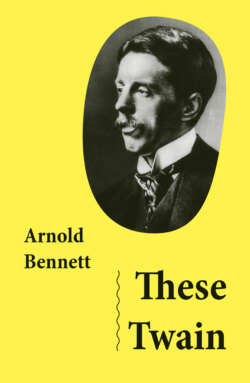Читать книгу These Twain (Unabridged) - Arnold Bennett - Страница 17
На сайте Литреса книга снята с продажи.
i
ОглавлениеAda was just crossing the hall to the drawing-room, a telegram on a salver in her red hand.
“Here you are, Ada,” said Edwin, stopping her, with a gesture towards the telegram.
“It’s for Mr. Tom Swetnam, sir.”
Edwin and Hilda followed the starched and fussy girl into the drawing-room, in which were about a dozen people, including Fearns, the lawyer, and his wife, the recently married Stephen and Vera Cheswardine, several Swetnams, and Janet Orgreave, who sat at the closed piano, smiling vaguely.
Tom Swetnam, standing up, took the telegram.
“I never knew they delivered telegrams at this time o’ night,” said Fearns sharply, looking at his watch. He was wont to keep a careful eye on the organisation of railways, ships, posts, and other contrivances for the shifting of matter from one spot to another. An exacting critic of detail, he was proud of them in the mass, and called them civilisation.
“They don’t,” said Tom Swetnam naughtily, glad to plague a man older than himself, and the father of a family. Tom was a mere son, but he had travelled, and was, indeed, just returned from an excursion through Scandinavia. “Observe there’s no deception. The envelope’s been opened. Moreover, it’s addressed to Ben Clewlow, not to me. Ben’s sent it up. I asked him to. Now, we’ll see.”
Having displayed the envelope like a conjurer, he drew forth the telegram, and prepared to read it aloud. One half of the company was puzzled; the other half showed an instructed excitement. Tom read the message:
“‘Twenty-seven pounds ten nine. Philosophers tell us that there is nothing new under the sun. Nevertheless it may well be doubted whether the discovery of gold at Barmouth, together with two earthquake shocks following each other in quick succession in the same district, does not constitute, in the history of the gallant little Principality, a double event of unique—’” He stopped.
Vera Cheswardine, pretty, fluffy, elegant, cried out with all the impulsiveness of her nature:
“Novelty!”
“Whatever is it all about?” mildly asked Mrs. Fearns, a quiet and dignified, youngish woman whom motherhood had made somewhat absent-minded when she was away from her children.
“Missing-word competition,” Fearns explained to her with curt, genial superiority. He laughed outright. “You do go it, some of you chaps,” he said. “Why, that telegram cost over a couple of bob, I bet!”
“Well, you see,” said Tom Swetnam, “three of us share it. We get it thirty-six hours before the paper’s out—fellow in London—and there’s so much more time to read the dictionary. No use half doing a thing! Twenty-seven pounds odd! Not a bad share this week, eh?”
“Won anything?”
“Rather. We had the wire about the winning word this morning. We’d sent it in four times. That makes about £110, doesn’t it? Between three of us. We sent in nearly two hundred postal orders. Which leaves £100 clear. Thirty-three quid apiece, net.”
He tried to speak calmly and nonchalantly, but his excitement was extreme. The two younger Swetnams regarded him with awe. Everybody was deeply impressed by the prodigious figures, and in many hearts envy, covetousness, and the wild desire for a large, free life of luxury were aroused.
“Seems to me you’ve reduced this game to a science,” said Edwin.
“Well, we have,” Tom Swetnam admitted. “We send in every possible word.”
“It’s a mere thousand per cent profit per week,” murmured Fearns. “At the rate of fifty thousand per cent per annum.”
Albert Benbow, entering, caught the last phrase, which very properly whetted his curiosity as a man of business. Clara followed him closely. On nearly all ceremonial occasions these two had an instinctive need of each other’s presence and support; and if Albert did not run after Clara, Clara ran after Albert.
